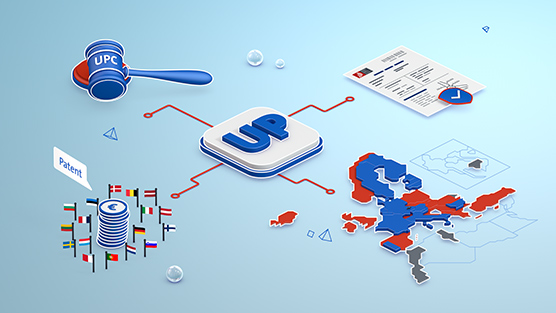From today, 1st June 2023, it is possible to get a Unitary Patent (UP) following grant of a European Patent by the European Patent Office (EPO). So what is it? And should you use it?
The UP is a European patent which has unitary effect in 17 European Patent Convention (EPC) states: Austria, Belgium, Bulgaria, Denmark, Estonia, Finland, France, Germany, Italy, Latvia, Lithuania, Luxembourg, Malta, the Netherlands, Portugal, Slovenia and Sweden. It is simple to obtain following grant of a European patent by filing a Request for Unitary Effect at the EPO.
Let’s look at some of the pros and cons of going the UP route when your European patent reaches grant. The biggest pro is that you have a single patent with the same protection in all 17 countries, with no need for any translations. The next is that a single annual renewal fee covers all 17 countries. But these two pros also lead to two potential cons. Firstly, the renewal fee has been set to correspond to the combined renewal fees due in the four countries where European patents were most often validated in 2015 (DE, FR, GB and NL), so if you typically only validate in 2 or 3 countries, the UP will be more expensive. And secondly, because it is a single patent, you can’t choose to drop any of the countries that it covers, or reduce the renewal fee.
The next big pro is that alongside the UP we have the new Unified Patents Court (UPC), which is the forum for taking infringement action against a UP. This means that you can sue for patent infringement in all 17 countries at once at this new central court. But the UPC is also the source of the biggest downside of the UP for patent owners – the validity of a UP can be attacked through the UPC, meaning that patent coverage in all 17 countries can be lost through a single (successful) validity attack. But, realistically, for the majority of SME patent owners the risk of a central validity attack is low, as is the likelihood that you will want to take infringement action.
And what about the rest of the EPC member states, including the UK, that are not currently participating in the UP? For these (non-UP) EPC states we will continue to validate European patents in the countries in which you want it to take effect – following the “classic” procedure, as we have always done, and annual renewal fees will continue to need to be paid for each country.
And what if you don’t want a UP? Well, you’ll be relieved to know that you don’t have to opt for a UP in the countries that it covers – a European patent can still be validated in the “classic” way in each of the countries participating in the UP.
One thing to note however, for classically validated European patents in both non-UP and UP states, is that the UPC is also now the forum for taking infringement action and validity action against all classically validated European patents, including those granted before today. It is possible to opt-out of the UPC’s jurisdiction, and many patent owners (particularly those with high value patents which might be at high risk of central validity attack) are choosing to do this. The question to consider, as noted above, is what the risk is to each patent that you own of a central validity attack by a third party competitor is, and what is the likelihood that you will want to take infringement action.
You can find more details about the UP and the UPC on the EPO website here: EPO – Unitary Patent
If you would like to discuss the implications of the UP and the UPC, and whether you should opt for the UP or opt-out of the UPC, our patent attorneys can advise and take the appropriate action on your behalf. Get in touch here or email us at hello@two-ip.com



